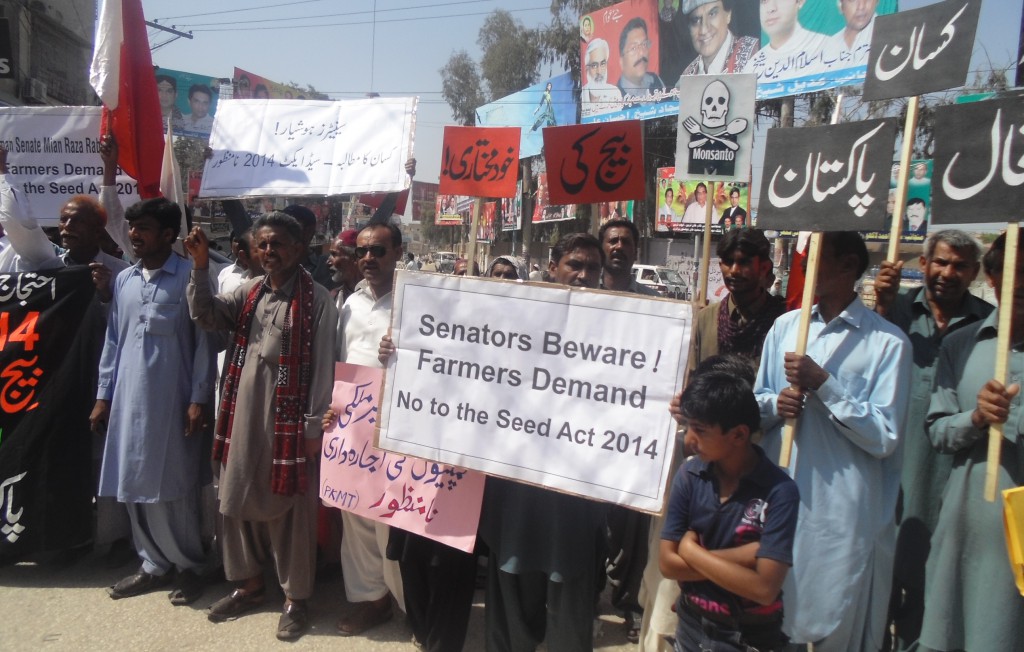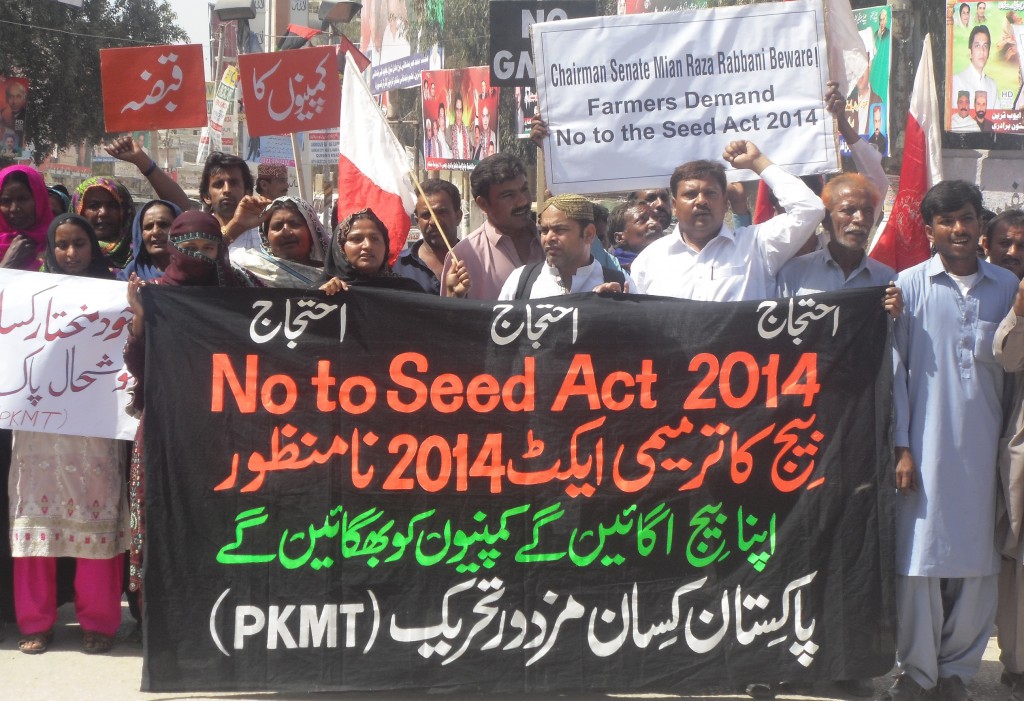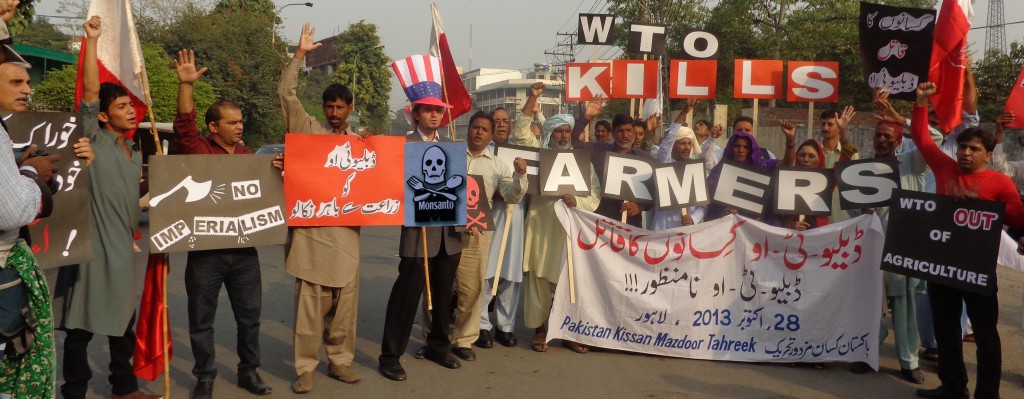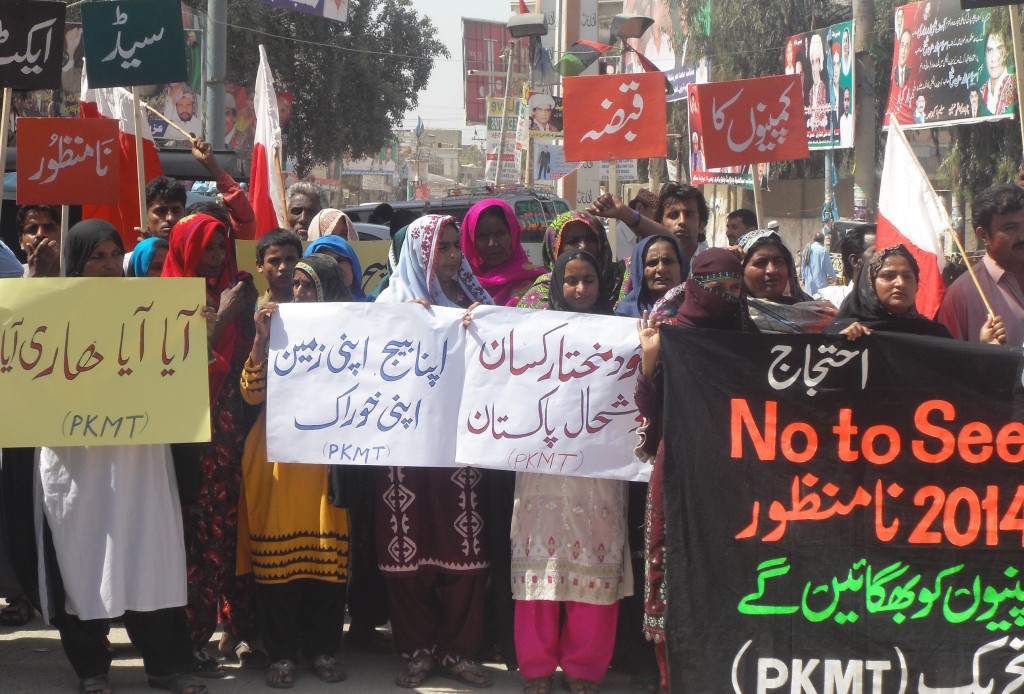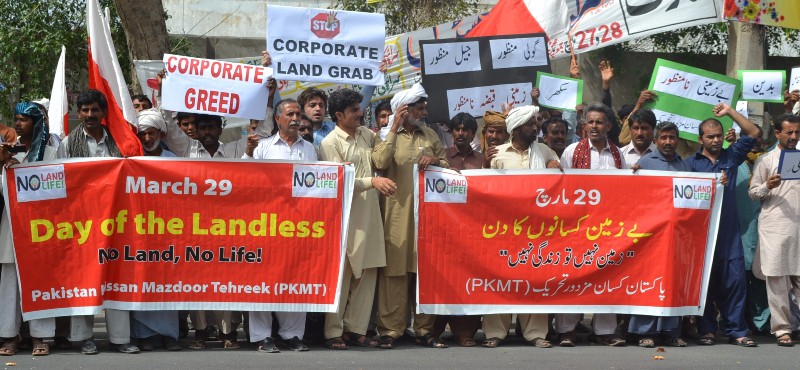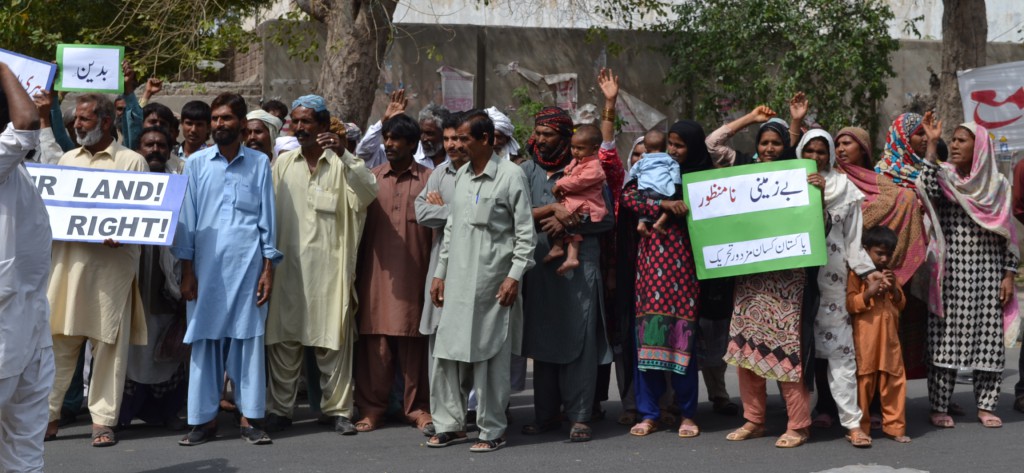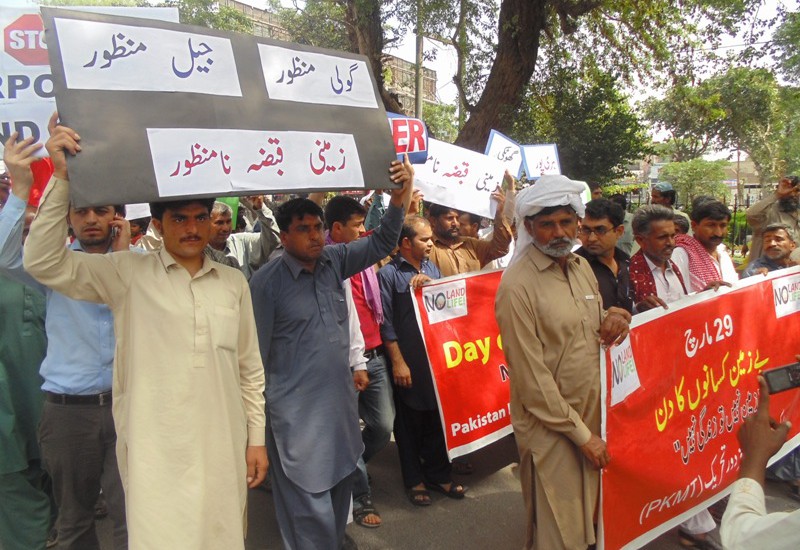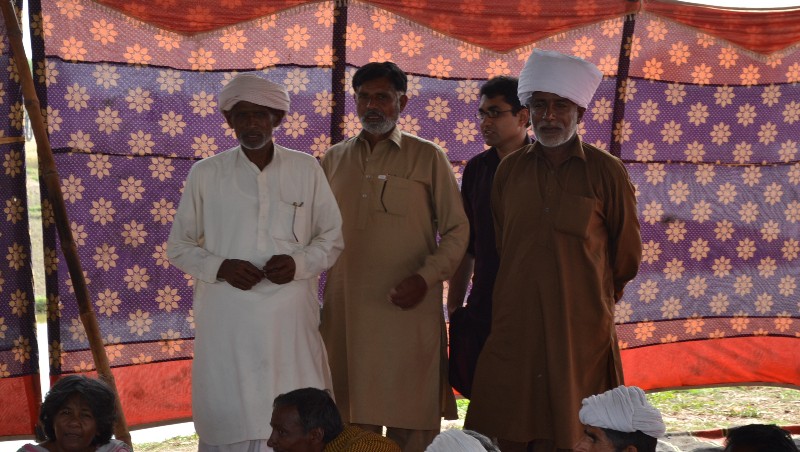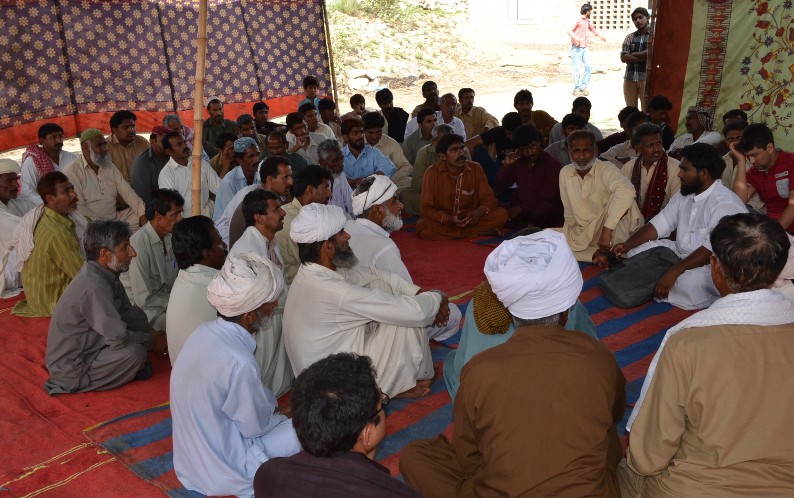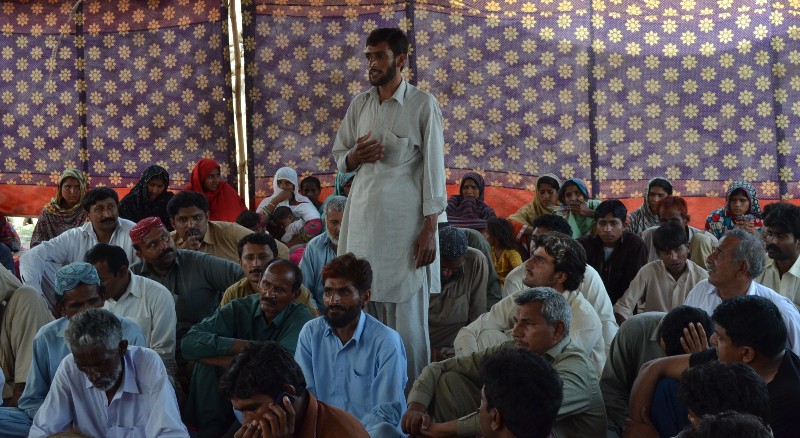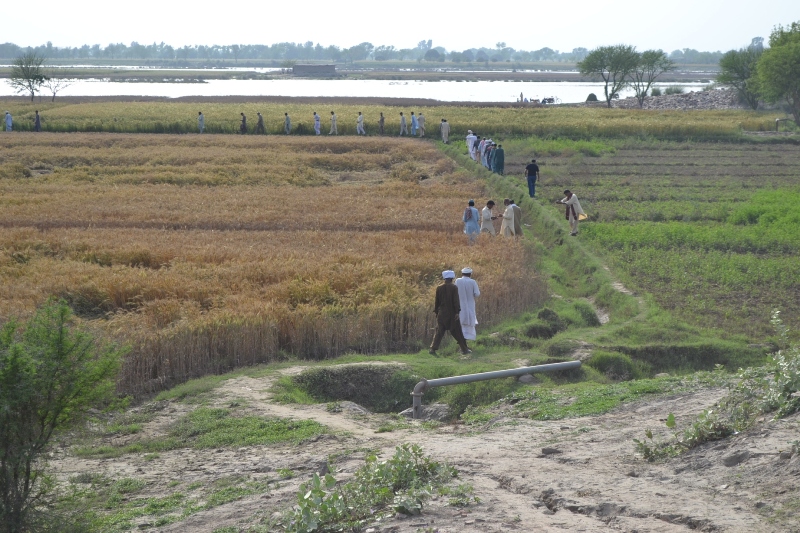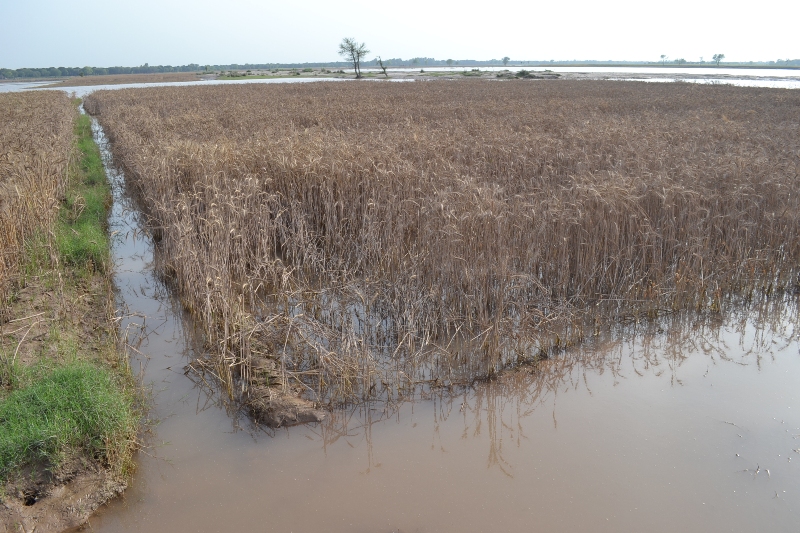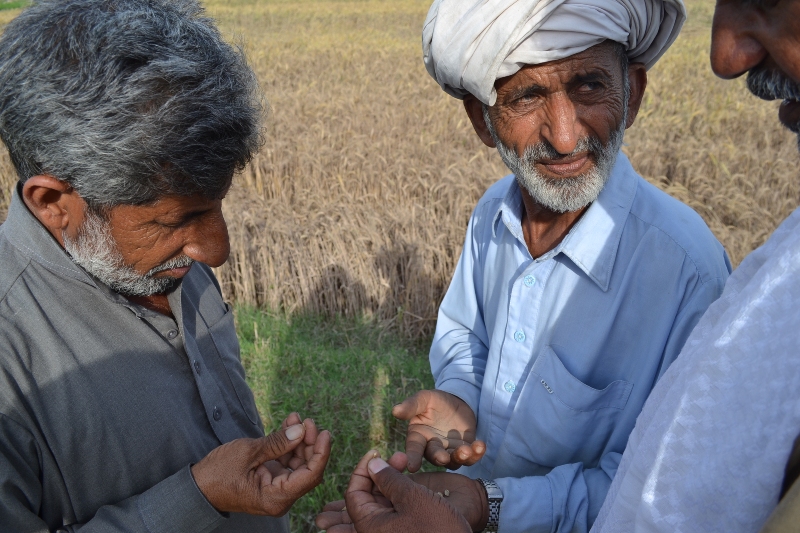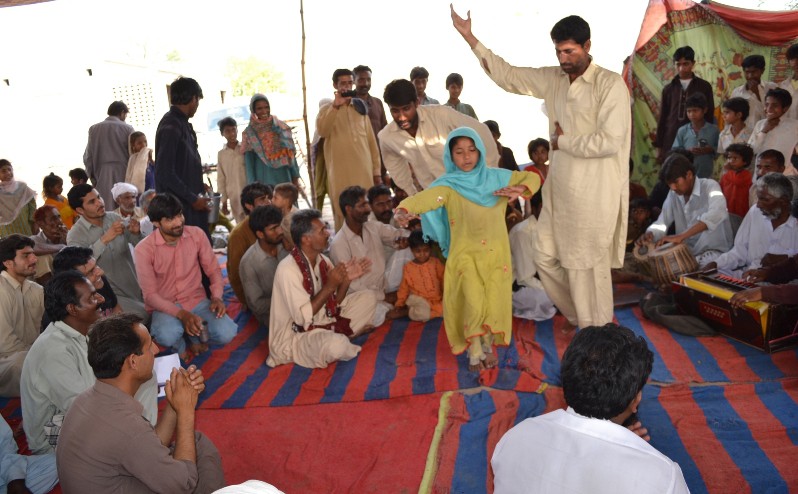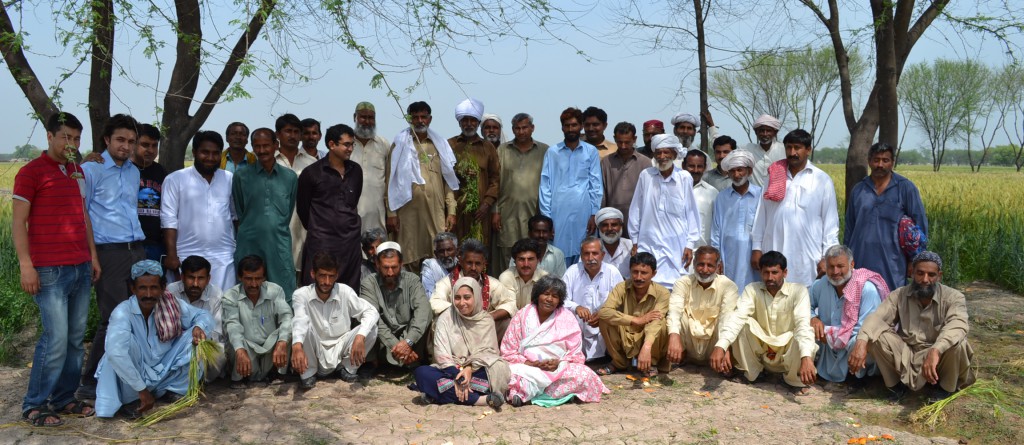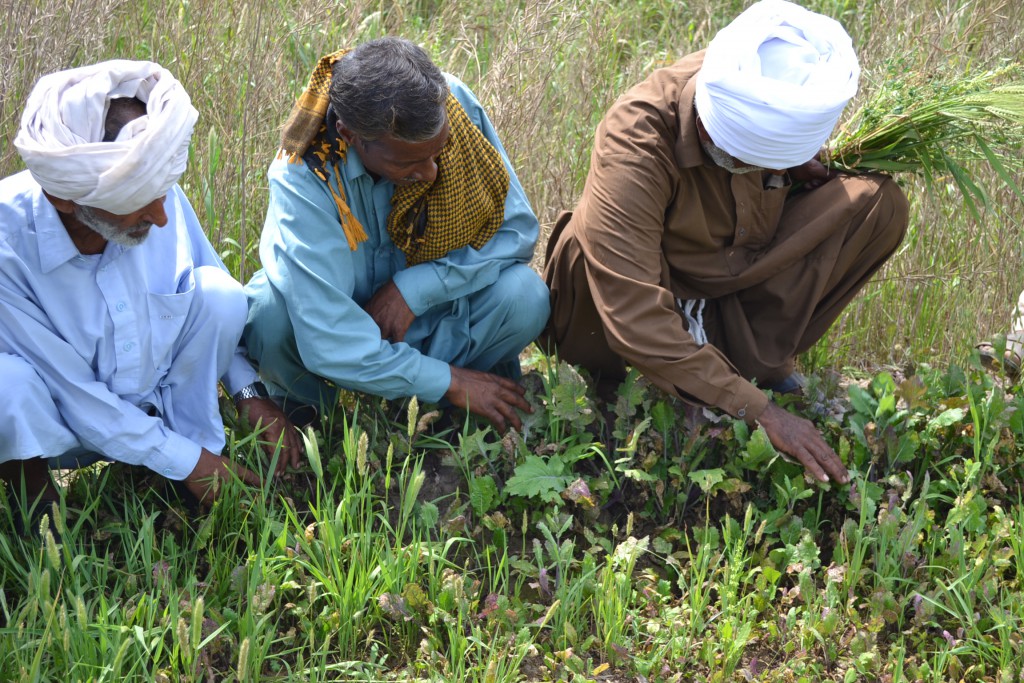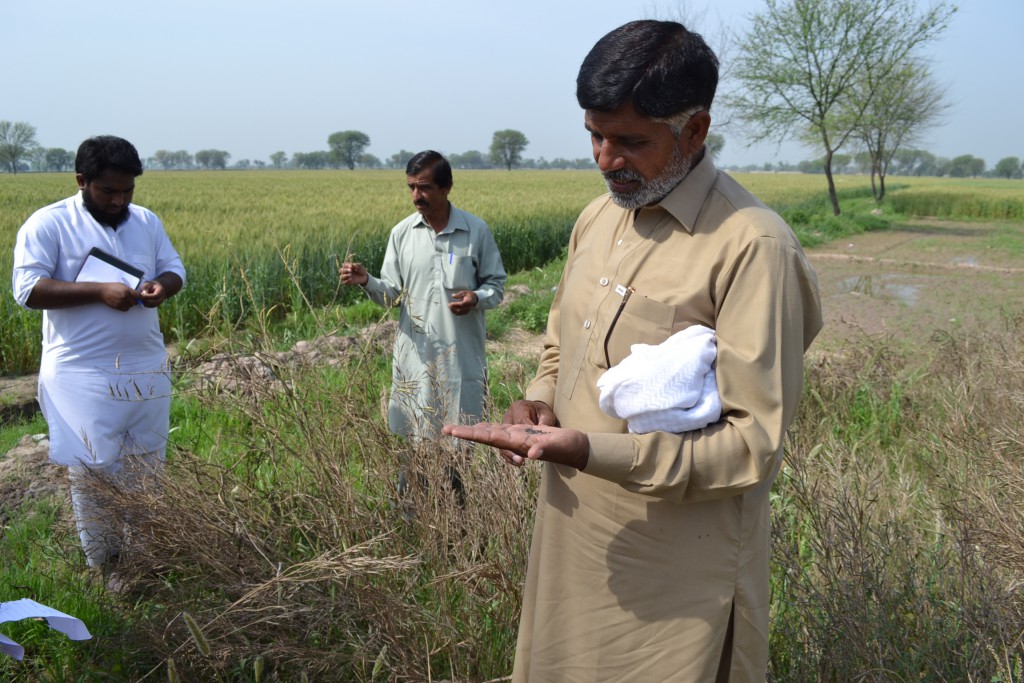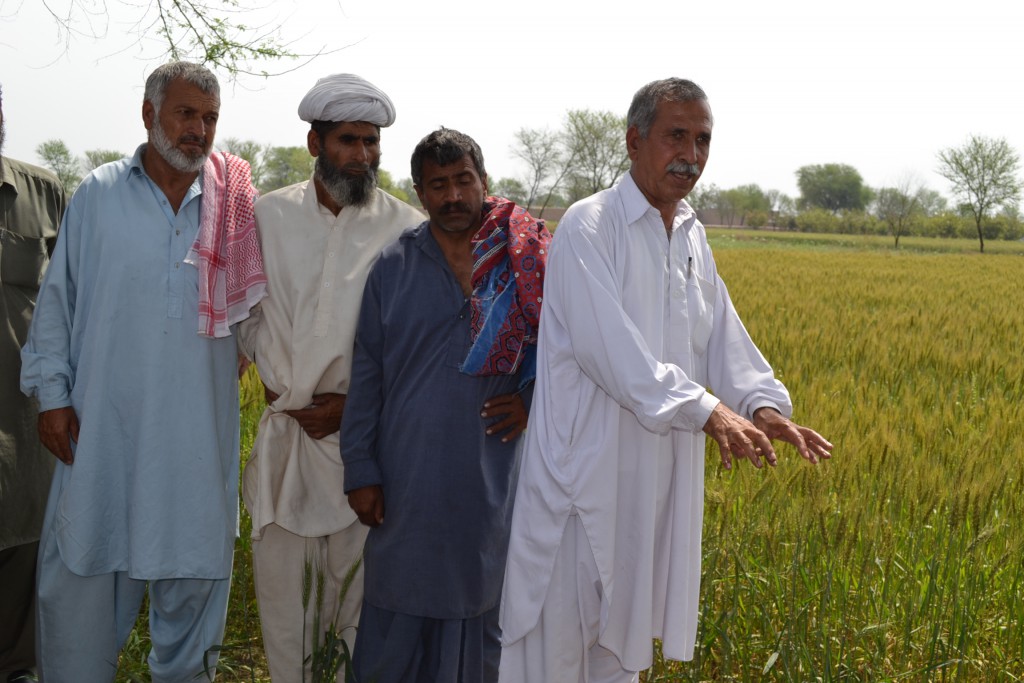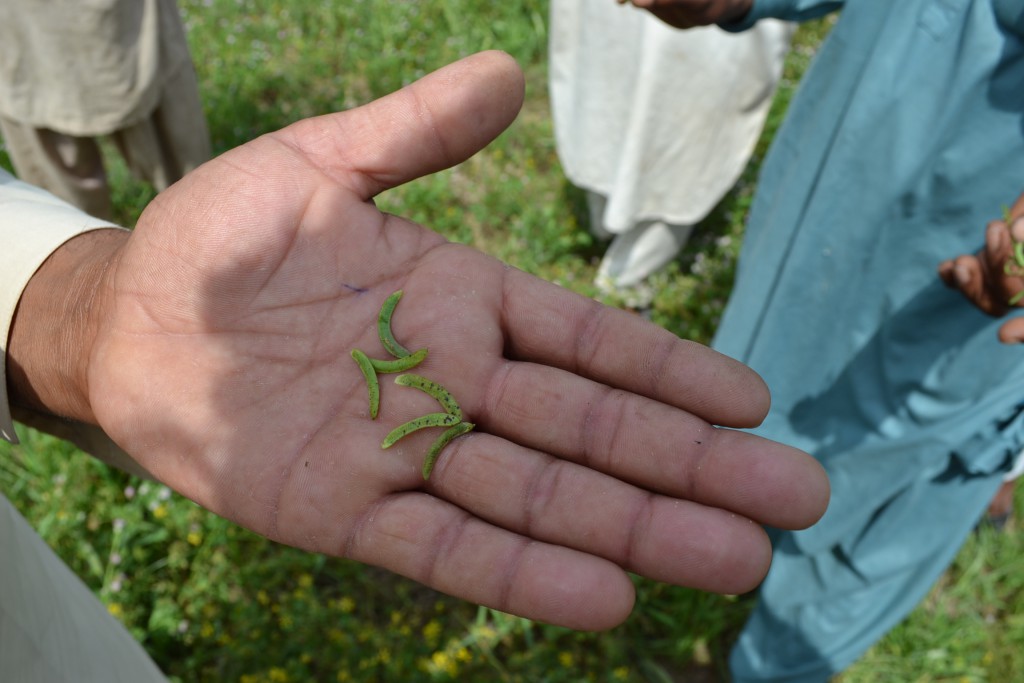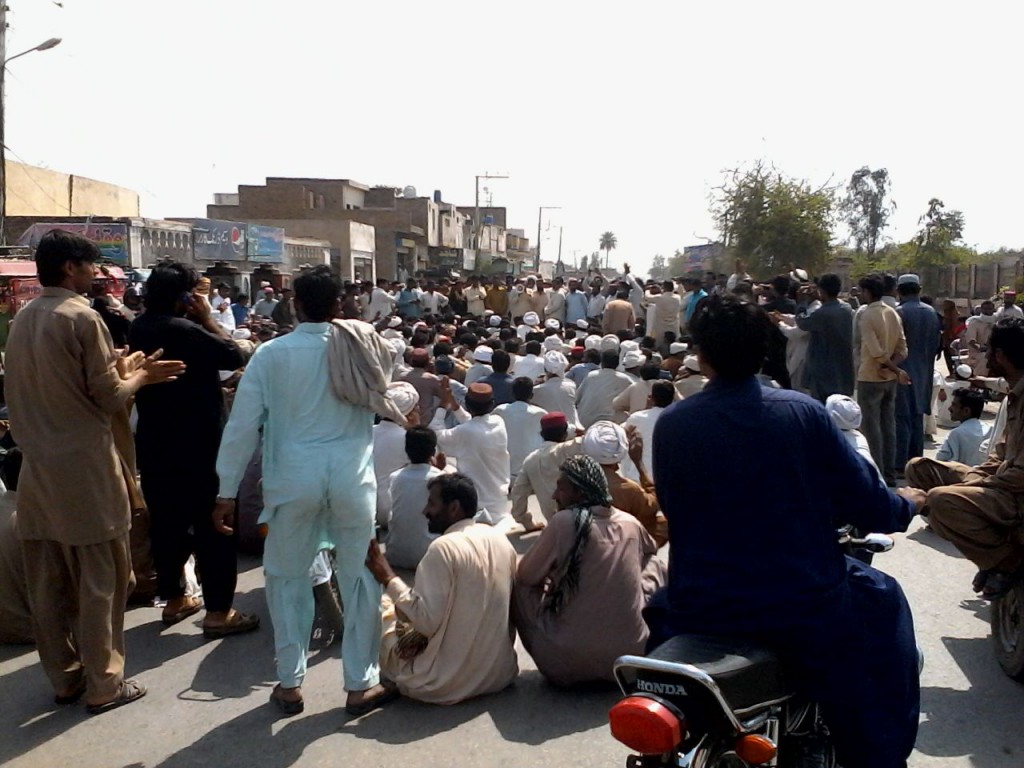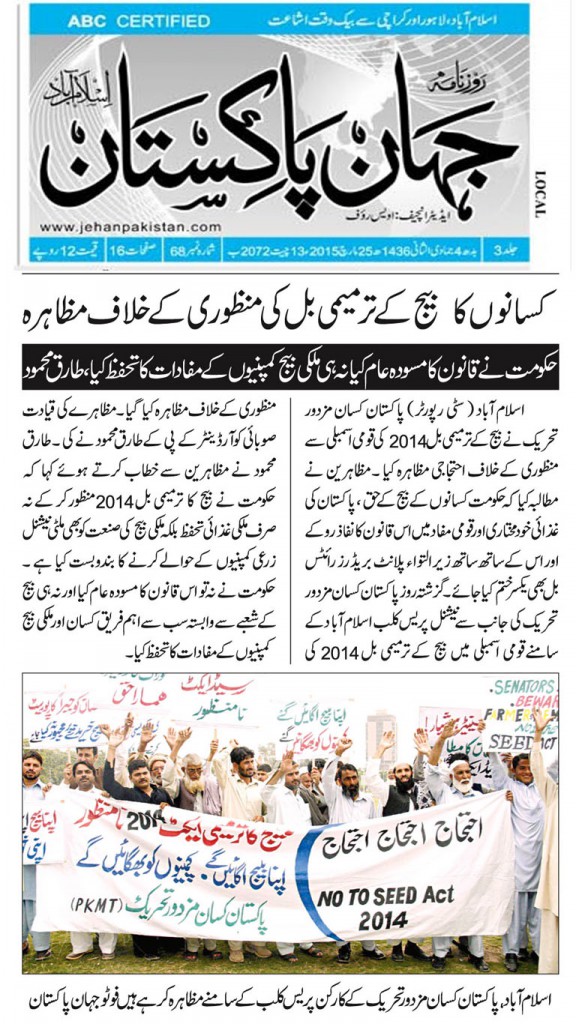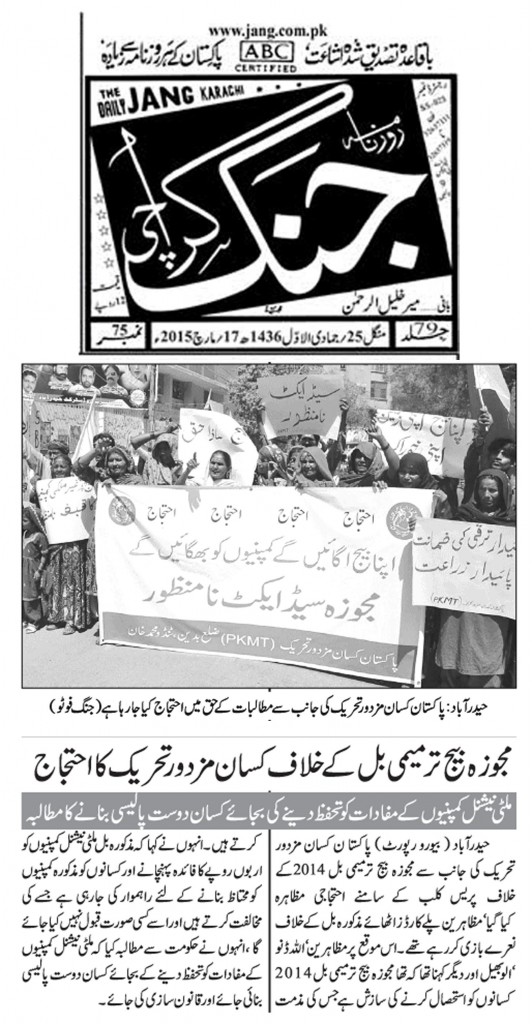
http://news.ptv.com.pk/khabarnama_flv_player.asp?name=KHABARNAMA%2016-03-2015&vid=29&desp=.&imge=khabranama.jpg
The Pakistan Amended Seed Act 2014 was approved in the National Assembly on March 16, 2015. This is very unfortunate and extremely tragic news for millions of small and landless farmers of Pakistan. PTV Cannel has released the news through its script coverage (trigger) on the bottom of TV screen. No other media news has as yet provided information on the approval of the Pakistan Amended Seed Act 2014.
In 1995, the extremely anti-people, anti-farmer World Trade Organization (WTO) was formed much against the will of the people, globally. A major reason for people protesting against the formation of the WTO was the Trade-related Aspects of Intellectual Property Rights Agreement (TRIPS) which demanded patent rights on seeds as well as all other new technologies.
Today just over 20 years later, Pakistan has amended its seed laws to comply with the monopolistic demands of mega agro-chemical corporations such as Monsanto, Syngenta, Pioneer and others.
The cost of the seed bill will be borne by the small and landless farmers who are already burdened by huge agricultural production costs such as chemical fertilizers, pesticide and other market driven agricultural inputs.
Billions of farmers across the globe suffering from aggressive neo-colonial legislation pounded by the WTO and corporate agriculture monopolistic giants. Policies range from brutal measures adopted for corporate land grab in Pakistan, to aggressive imports of agriculture related technologies ranging from genetic engineering, animal husbandry, green economy (such as solar tube wells, biogasse plants, hydroponics, etc) are all being pushed on poor third world countries.
Pakistan is no exception. From aggressive land grab in many parts of the country to now the approval of the Amended Pakistan Seed Act 2014, the agricultural sector, the life line of the country is under terrible ambush from the capitalist countries.
The Amended Pakistan Seed Act 2014 is the desire of transnational corporations such as Monsanto, Pioneer and Syngenta. The United States Agriculture Department has many times stated the lack of intellectual property to its genetically modified seeds in the country, urging the country to amend its seed and other intellectual property right laws.
The Plant Breeders Rights Act is also pending in the National Assembly and no doubt will soon follow the same path as the Amended Pakistan Seed Act 2014: another blow to the meager livelihood of farmers.
According to DAWN news, the Mr Sikander Bosan Minister for National Food Security and Research, a new seed laws are needed to fulfill the needs of the modern seed industry; of course the modern industry is entirely in the hands of the big corporate giants.
Roots for Equity has been opposing the grotesque corporate agricultural policies being inflicted on Pakistani agriculture and struggling farmers in the country since its inception in 1997. An alliance of small and landless farmers namely, the Pakistan Kissan Mazdoor Tehreek formed in 2008 has also stringently rejected the bill and has been demonstrating again the Bill (which has been various shapes in the past years. But the so called democratic system in Pakistan under first the Zardari government and now Nawaz Sharif have obeyed the order of their ‘masters’ in the imperialist countries of the North.
No doubt today, with the passing of the Seed Amendment Bill 2014, the country has lost an important pillar of its sovereignty.
However, history of nations are not written by the signing of laws by oppressive forces but the strength of the peoples determination, voices and actions. It is the peoples’ struggle which will overthrow imperialist powers and put in place genuine peoples democracy in the country!
According to the Pakistan Kissan Mazdoor Tehreek, they stand firm against the new Act and will take various actions against the grotesque law, which will intensify pauperization of farmers.
In 1995, the extremely anti-people, anti-farmer World Trade Organization (WTO) was formed much against the will of the people, globally. A major reason for people protesting against the formation of the WTO was the Trade-related Aspects of Intellectual Property Rights Agreement (TRIPS) which demanded patent rights on seeds as well as all other new technologies.
Today just over 20 years later, Pakistan has amended its seed laws to comply with the monopolistic demands of mega agro-chemical corporations such as Monsanto, Syngenta, Pioneer and others.
The cost of the seed bill will be borne by the small and landless farmers who are already burdened by huge agricultural production costs such as chemical fertilizers, pesticide and other market driven agricultural inputs.
Billions of farmers across the globe suffering from aggressive neo-colonial legislation pounded by the WTO and corporate agriculture monopolistic giants. Policies range from brutal measures adopted for corporate land grab in Pakistan, to aggressive imports of agriculture related technologies ranging from genetic engineering, animal husbandry, green economy (such as solar tube wells, biogasse plants, hydroponics, etc) are all being pushed on poor third world countries.
Pakistan is no exception. From aggressive land grab in many parts of the country to now the approval of the Amended Pakistan Seed Act 2014, the agricultural sector, the life line of the country is under terrible ambush from the capitalist countries.
The Amended Pakistan Seed Act 2014 is the desire of transnational corporations such as Monsanto, Pioneer and Syngenta. The United States Agriculture Department has many times stated the lack of intellectual property to its genetically modified seeds in the country, urging the country to amend its seed and other intellectual property right laws.
The Plant Breeders Rights Act is also pending in the National Assembly and no doubt will soon follow the same path as the Amended Pakistan Seed Act 2014: another blow to the meager livelihood of farmers.
According to DAWN news, the Mr Sikander Bosan Minister for National Food Security and Research, a new seed laws are needed to fulfill the needs of the modern seed industry; of course the modern industry is entirely in the hands of the big corporate giants.
Roots for Equity has been opposing the grotesque corporate agricultural policies being inflicted on Pakistani agriculture and struggling farmers in the country since its inception in 1997. An alliance of small and landless farmers namely, the Pakistan Kissan Mazdoor Tehreek formed in 2008 has also stringently rejected the bill and has been demonstrating again the Bill (which has been various shapes in the past years. But the so called democratic system in Pakistan under first the Zardari government and now Nawaz Sharif have obeyed the order of their ‘masters’ in the imperialist countries of the North.
No doubt today, with the passing of the Seed Amendment Bill 2014, the country has lost an important pillar of its sovereignty.
However, history of nations are not written by the signing of laws by oppressive forces but the strength of the peoples determination, voices and actions. It is the peoples’ struggle which will overthrow imperialist powers and put in place genuine peoples democracy in the country!
According to the Pakistan Kissan Mazdoor Tehreek, they stand firm against the new Act and will take various actions against the grotesque law, which will intensify pauperization of farmers.
